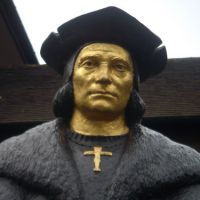A fairly well done piece here that points out things forgotten. See How (and Where) Lincoln Won.
The article points out in places certain aspects of that election that the average person has forgotten today.
Here are some:
Normally a candidate with such geographically limited appeal wouldn’t stand a chance. But Lincoln had a few advantages. For one, he benefited from a deep divide among the Democrats and between the Upper and Lower South. Many Democrats in the South refused to support northerner Stephen Douglas as the party’s nominee; following a convention in Charleston, these Southern Democrats formed a separate party and chose Breckinridge as their candidate.
In history classes the importance at what happened at the Democratic convention in South Carolina is often overlooked. The Northern Democrats refused to concede to the demand of Southern Democrats that basically they support a Federal Slave Code. Which by the way would have also been a major expansion of Federal Power. In many ways the Secession started here and on this date for all practical purposes. The die had been cast.
The article does a good job talking about how John Bell and Breckinridge affected the race.
We then see this:
Yet voting patterns were more complicated than the map indicates. In Georgia and Louisiana, Unionists provided a powerful counterweight to the Southern Democrats. Similarly, a vote for Southern Democrats did not always predict secession. While a majority in Delaware and Maryland voted Southern Democrat, those states remained loyal. Conversely, in Tennessee Bell actually defeated Breckinridge, even though that state seceded in early June. Kentucky and North Carolina were split between the two parties, and while the former remained in the Union, the latter did not. The winner-take-all model of the Electoral College obscures this complexity.
Now of course some of these States were kept in the Union technically perhaps because there were so many troops around and Lincoln acted quickly. See Maryland. But the Unionists anti secession vote in the South is often a big topic that sadly gets overlooked.
The motivation of these Unionist I am sure differed from place to place. For instance it is doubtful that in the Deep South cities of New Orleans & Natchez Mississippi (which is not mentioned). Natchez was a hotbed of Union supporters. No doubt this was not because of the issue of slavery but because these men had the business and political sense that the South was about to embark on one unmitigated disaster. Further in Louisiana the economic positions of the GOP were much more aligned in many cases with certain factions in the State. See the issue of the tariff and the Louisiana sugar economy. While Lincoln was not on the ballot in Louisiana the Unionist at least provided an alternative to the anti tariff Southern Democrats.
In other places the Unionist support had mixed motives. That is the hardcore political and business outlook to those that were not particular concerned over keeping Slavery. We see this in portions of North Louisiana, Northern Arkansas, Northern Mississippi, Northern Alabama, and Northern Georgia. In fact German immigrants in part of Texas after the election stayed loyal to the Union in large part because of the slavery issue in some considerable numbers during the war.
The article hints that perhaps this gave some false hope:
After Texas voted to secede on Feb. 1, months passed without another state joining the Confederacy. The strong showing of the Constitutional Union Party in the Upper South further convinced him that secessionists were a distinct minority. But the crisis at Fort Sumter ended hopes of a rebellion limited to the Lower South, and soon Americans found themselves in one of history’s bloodiest wars.
Anyway interesting article
Wednesday, November 10, 2010
New York Times Looks At GOP Victory - The GOP and the Election of 1860
Posted by
James H
at
11/10/2010 07:51:00 AM
![]()
Labels: Civil War History, United States History
Subscribe to:
Post Comments (Atom)















No comments:
Post a Comment